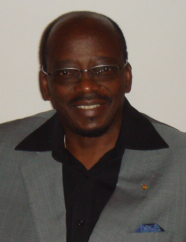Atsutsè Kokouvi Agbobli
Atsutsè Kokouvi Agbobli was born on April 23rd 1941 in Lomé (Togo).Holder of a Ph.D. in history from University of Sorbonne and graduated from the Institut d'Etudes Politiques de Paris (Sciences Po), Atsutsè Kokouvi Agbobli was successively teacher in Gabon, Head of general policy affairs, defense and security at the General Secretariat of the Organization of African Unity (OAU), now African Union (AU), in Addis Ababa (Ethiopia), regional expert and senior officer in charge of programs and relations at the African branch of the International Labor Office (ILO), columnist with the weekly newspaper Jeune Afrique in Paris, director of the Pan African Institute of International Relations (IPRI) in Geneva and editor of the bimonthly newspaper Afric'Hebdo he founded in 2005 in Lomé.
During his university years, he was President of the Association of Students and Interns of Togo in France (AESTF) and Vice-President in charge of Foreign Relations for the Federation of Black African Students in France (FEANF). Returning from an exile of more than two decades because of his political views, Atsutsè Kokouvi Agbobli was the delegate of the Club of Friends of Freedom and Democracy in Black Africa (CALDAN) to the National Sovereign Conference of Togo which he chaired the Defense and Security Commission during the summer of 1991. Between 1994 and 1996, he was successively Minister of Communication and Culture and Minister in charge of Relations with Parliament in the government formed after the first truly democratic elections in Togo. At the time of his tragic death, Atsutsè Kokouvi Agbobli was the president of the national executive board of the Movement for National Development (MODENA), an opposition party created in 2007.
Stirrer of ideas and opinion leader, Atsutsè Kokouvi Agbobli published several articles in French, African and Togolese newspapers and magazines on major social, political and geo-political issues of the contemporary world and hosted dozens of conferences in Africa and elsewhere. Apart from these writings, his bibliography is composed of four books. The first is Sylvanus Olympio, un destin tragique (Sylvanus Olympio, a tragic fate) in 1992, then reissued, revised and expanded in 2007 under the title Sylvanus Olympio, le père de l'indépendance togolaise (Sylvanus Olympio, the father of Togo independence). Then a book of interviews with Dr. Jonas Savimbi, founding president of the National Union for Total Independence of Angola (UNITA), assassinated in February 2002, entitled Combats pour l'Afrique et la démocratie (Fights for Africa and Democracy). Finally, he published in 2002 the first volume of the trilogy Le monde et le destin des Africains, Les enjeux mondiaux de puissance (The world and the destiny of Africans, the challenges of might) with L'Harmattan Éditions.
Driven by an ideal of progress, Atsutsè Kokouvi Agbobli always fought for the freedom and the emancipation of African peoples. Pan-Africanist militant, he struggled for a united, prosperous and industrial continent in competition with the others and for that he did not hesitate to fight without mercy against all reactionary forces in Africa. The struggle for a proud and strong Africa was his entire life.
